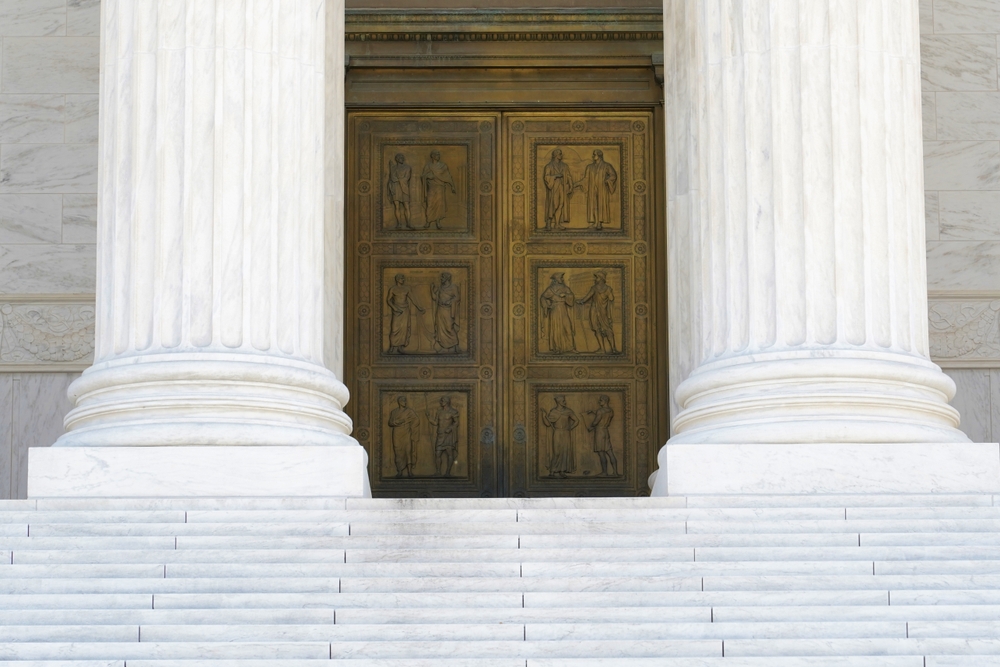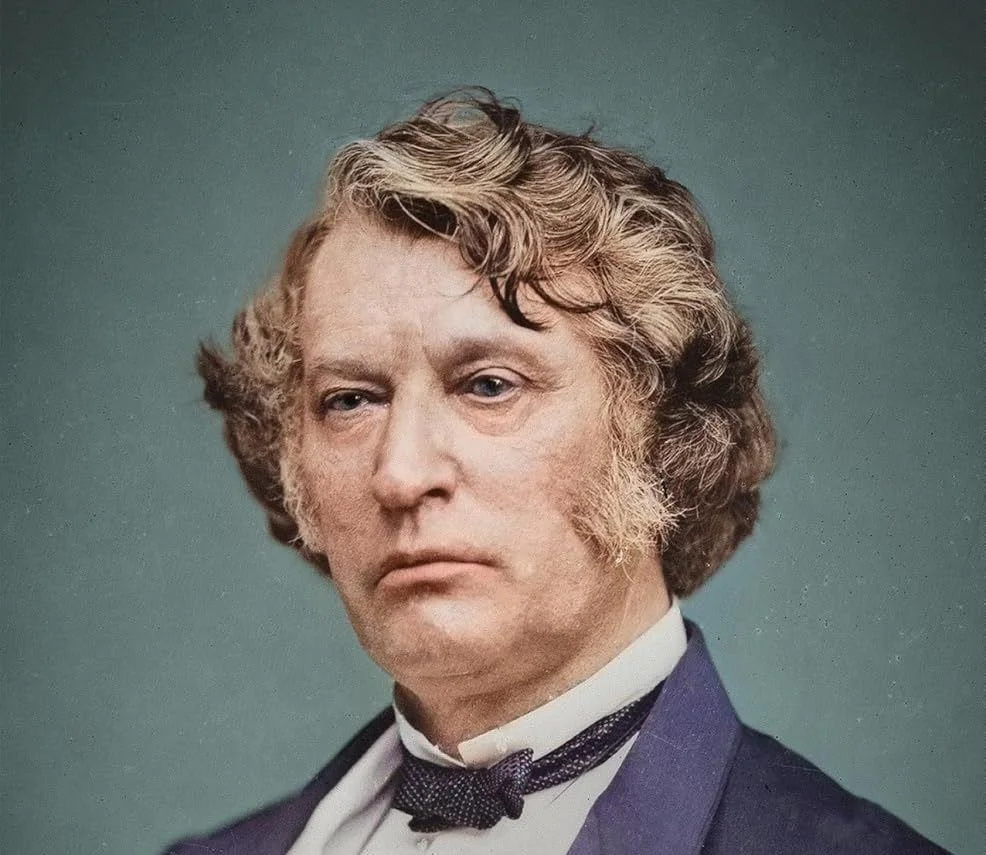
Suspending Habeas Corpus: A Lincolnian Guide
Lincoln defended his suspension of the writ of habeas corpus on the basis of the fundamental difference between crime and war.
If invoking the 1798 Alien Enemies Act and claiming that illegal immigration amounts to an invasion of the United States were not enough, the White House has now floated the idea of suspending the writ of habeas corpus. Trump officials are searching for a way to deport, without the hearings required by immigration law, the millions of aliens who crossed the southern border thanks to the Biden administration’s lax enforcement policies. The White House may be able to draw upon fundamental claims of presidential power made by Abraham Lincoln at the start of the Civil War. But it will have the difficult, perhaps insurmountable challenge of persuading the American people that we face an emergency comparable to the ones that faced our greatest Presidents.
Last week, Stephen Miller, the deputy White House chief of staff, declared that the Trump Administration is “actively looking at” the possibility of suspending habeas corpus. “Well, the Constitution is clear—and that, of course, is the supreme law of the land—that the privilege of the writ of habeas corpus can be suspended in a time of invasion,” Miller said. “A lot of it depends on whether the courts do the right thing or not.”
Miller’s arguments exploit an ambiguity in the constitutional text. Article I, Section 9 declares that “The Privilege of the Writ of Habeas Corpus shall not be suspended, unless when in Cases of Rebellion or Invasion the public Safety may require it.” Habeas corpus may be the right that guarantees all the others. It demands that the government produce someone it holds before a court to justify the detention’s lawfulness – the Framers recognized that the exigencies of war and rebellion could justify its suspension.
The Framers located the Suspension Clause, as it is known, in Article I, which organizes the legislature and enumerates its powers, and in Section 9, limits congressional power, such as bans on ex post facto laws and direct taxes. But the Framers also wrote the Clause in the passive tense without identifying to whom it applied. Some provisions in Section 9 specifically address Congress (such as allowing a ban on the slave trade after 1808), while others do not. This structure suggests that the Suspension Clause restricts the entire federal government, not just Congress, and it also implies that the President can suspend habeas.
Nonetheless, critics greeted Miller’s arguments with scorn. In the Wall Street Journal, columnist William A. Galston wrote the most thoughtful piece against Miller’s claim. He argued that the Constitution only gives Congress power over habeas corpus. But rather than rely simply on the placement of the Suspension Clause in Article I, Galston and the scholars upon whom he relies claim that “no President has ever suspended habeas corpus without Congress.” Galston even relied on the only example of a President who suspended habeas corpus, Abraham Lincoln, to prove his point. After reviewing Lincoln’s imprisonment of Confederate prisoners at the very start of the Civil War, Galston declares that “neither constitutional law nor history supports the proposition that President Trump can suspend the writ without congressional review and authorization.”
Contemporaries, however, would not have understood Lincoln’s actions as a concession that only Congress controls the suspension of habeas. Quite the opposite, in fact. Lincoln interpreted his constitutional powers to give him the initiative in responding to the Civil War. On April 27, 1861, he unilaterally suspended the writ of habeas corpus on the route from Philadelphia to Washington – in addition to raising a military, launching offensive operations against the South, and withdrawing money from the Treasury to pay for it. The suspension allowed Union authorities to replace civilian law enforcement with military detention without trial, preventing Confederate prisoners, rebel spies, and operatives from petitioning the civilian courts for release.
A case presented Chief Justice Roger Taney, Jackson’s Attorney General and the author of the disastrous Dred Scott v. Sanford, with the perfect opportunity to make the very same arguments made by Galston. Union officers had arrested John Merryman, an officer in a secessionist Maryland militia, for participating in the destruction of the railroads near Baltimore. Upon the petition of Merryman’s lawyer, Taney issued a writ of habeas corpus ordering the commander of Union forces in Maryland to produce Merryman in court. The general refused to appear and instead sent an aide to notify Taney that Merryman had been detained under the President’s suspension of habeas corpus. Taney held the general in contempt, but the marshal serving the order could not gain entry to Fort McHenry.
Taney was left to issue an opinion that sought to destroy Lincoln’s claim of constitutional authority to defeat secession. He held that the Suspension Clause’s placement in Article I and judicial commentary since ratification recognized that only Congress could suspend the writ. If military detention without trial were permitted to continue, Taney wrote, “the people of the United States are no longer living under a government of laws.” Under presidential suspension, “every citizen holds life, liberty and property at the will and pleasure of the army officer in whose military district he may happen to be found.” Taney’s opinion clearly questioned the legal basis for Lincoln’s other responses to secession. Beyond suspending habeas corpus, he wrote, the Lincoln administration “has, by force of arms, thrust aside the judicial authorities and officers to whom the constitution has confided the power and duty of interpreting and administering the laws, and substituted a military government in its place, to be administered and executed by military officers.”
Ex Parte Merryman was not just an attack on Lincoln’s suspension of the writ, but upon the President’s right to interpret the Constitution. Taney declared that it was the responsibility of “that high officer, in fulfillment of his constitutional obligation” under the Take Care Clause to enforce the court’s orders. It was another declaration of judicial supremacy in interpreting the Constitution, to be expected of the Justice who had written Dred Scott, though perhaps not from Jackson’s Attorney General. Taney dramatized the conflict between the President and the judiciary by appearing before a crowd of 2,000 on the Baltimore courthouse steps to receive the commanding general’s refusal to comply. Taney declared that the officer was defying the law and that even the Chief Justice might soon be under military arrest.
Lincoln answered Taney and the widespread claims of executive dictatorship in his July message to a special July 4 session of Congress. Lincoln stressed that the Confederacy had fired the first shot before the national government had taken any action that might threaten slavery. Secession attacked only the process of “time, discussion, and the ballot box.” In response, “no choice was left but to call out the war power of the Government; and so to resist force, employed for its destruction, by force, for its preservation.” He recited the litany of actions that followed: calling out the militia, the blockade, the call for volunteers, and the expansion of military spending. Lincoln claimed that he had moved forcefully with the support of public opinion. “These measures, whether strictly legal or not, were ventured upon, under what appeared to be a popular demand, and a public necessity; trusting, then as now, that Congress would readily ratify them.” Lincoln avoided the question of whether he had acted unconstitutionally. He sought justification from Congress’s political support, after the fact. “It is believed that nothing has been done beyond the constitutional competency of Congress.” Congress enacted a statute that did not explicitly authorize war against the South but declared that Lincoln’s actions “respecting the army and navy of the United States, and calling out or relating to the militia or volunteers from the States, are hereby approved and in all respects legalized and made valid . . . as if they had been issued and done” by Congress.
Putting the lie to the claim made by today’s Trump critics, however, Congress did not give its blessing to the suspension of habeas corpus. Even as it immediately approved his unilateral raising and funding of the military and the launch of war, Congress did not enact a Habeas Corpus Act until March 1863. Congress waited two years after the firing on Fort Sumter and after the Battle of Antietam and the Emancipation Proclamation to address habeas. Lincoln had imposed martial law immediately in the areas of fighting; by September 1862, he had extended it throughout the nation to anyone providing aid or comfort to the rebels. According to Galston and other Trump critics, the Union must have violated the Constitution every time it took a confederate soldier, rebel, and northern sympathizer prisoner until March 1863. Even after the passage of the Habeas Corpus Act, the Lincoln administration continued to apply martial law in violation of its restrictions until the end of the war.
Lincoln’s July 4, 1861, special message mounted a powerful defense of these policies. After noting that the Framers had written the Suspension Clause in the passive tense and thus left open whether the President could invoke it, Lincoln argued that his presidential duty called upon him to protect the Constitution first, and the decisions of the Supreme Court second. “The whole of the laws which were required to be faithfully executed, were being resisted, and failing of execution, in nearly one-third of the States.” Saving the Union from a mortal threat, Lincoln suggested, could justify a violation of the Constitution and the laws, and certainly a single provision. In a famous passage, Lincoln asked, “[A]re all the laws, but one, to go unexecuted, and the government itself go to pieces, lest that one be violated?” He suggested that painstaking attention to the habeas corpus provision would come at the expense of his ultimate constitutional duty—preserving the Union. “Even in such a case, would not the official oath be broken, if the government should be overthrown, when it was believed that disregarding the single law, would tend to preserve it?”
Lincoln performed some acrobatics to pull back from a constitutional conflict. It was obvious that the nation indeed was confronted with a “rebellion or invasion” as required by the Suspension Clause. Lincoln explained that the Constitution could not possibly be interpreted to prevent the prompt executive action needed to prevent secession. “[A]s the provision was plainly made for a dangerous emergency,” he wrote, “it cannot be believed the framers of the instrument intended, that in every case, the danger should run its course, until Congress could be called together.” Lincoln would later argue that the civilian law enforcement could not operate in an actual armed conflict. Under the laws of war, the Union could kill Confederate combatants and seize them, as the more humane alternative, as enemy prisoners. In his usual homespun style, Lincoln asked why secessionists who had taken up arms against the Union should benefit from the Constitution. “Under cover of ‘liberty of speech,’ ‘liberty of the press,’ and ‘habeas corpus,’” Lincoln claimed, the Confederacy “hoped to keep on foot among us a most efficient corps of spies, informers, suppliers, and aiders and abettors of their cause in a thousand ways.” Enemies were not just those who took up arms against the Union, but those who attempted to prevent the mobilization of its men and industry. Words could be just as deadly as bullets. “He who dissuades one man from volunteering, or induces one soldier to desert, weakens the Union cause as much as he who kills a Union soldier in battle.” In one of his memorable turns of phrase, Lincoln asked: “Must I shoot a simple-minded soldier boy who deserts, while I must not touch a hair of a wily agitator who induces him to desert?”
Arresting civilians for crimes and detaining the enemy in war achieved different goals in different circumstances. “The former is directed at the small percentage of ordinary and continuous perpetration of crime,” Lincoln argued, “while the latter is directed at sudden and extensive uprisings against the Government.” During war, detention “is more for the preventive and less for the vindictive.” He rejected the Democrats’ argument that military detention could run only on the battlefield or in occupied territory. Lincoln interpreted the Constitution as allowing suspension of the writ “whenever the public safety” requires, not just in areas of actual combat. Lincoln remained conscious that political speech should not be suppressed. When Democrats criticized his detention policies of Confederate sympathizers, Lincoln responded: Lincoln defended his suspension of the writ of habeas corpus based on the fundamental difference between crime and war. The nature of war required detentions without trial, which “have been for prevention, and not for punishment—as injunctions to stay injury, as proceedings to keep the peace.”
Historians and political scientists have long criticized Lincoln for overstepping in limiting civil liberties, but no one doubts that he did so with the best of intentions, in unprecedented circumstances. Americans were fighting Americans, and the mobilization of the home front held the key to victory. It is easy today, with the benefit of hindsight, to argue that Lincoln went too far. But it is also impossible to know, either at the time or even now, whether his policies kept the North committed and prevented Southern successes behind the lines. Lincoln’s approach to civil liberties may well have been an indispensable part of his overall strategy to win the Civil War, though one that came with a high price.
But contrast the difficult challenges faced by Lincoln – surely the worst that ever confronted an American President – with those before the Trump White House today. We face no armed conflict or insurrection that threatens the very existence of the United States. As I observed in this space regarding President Trump’s invocation of the Alien Enemies Act, no declared war or conventional invasion is occurring today. Trump White House officials may believe that the illegal entry of millions of aliens, with drug dealers and terrorists mixed in, qualifies as an invasion. But the Founders would not have seen it that way. The Founders would have understood an invasion as a hostile entry by an armed force into the territory of the United States. An enemy would conduct an invasion, ultimately a sovereign state, but also possibly pirates and Indian tribes.
Immigration is very different. Migration across the border by illegal aliens is a persistent social, economic, and political problem, but one that does not have the immediate threat of harm by a foreign agent that characterizes war (of course, this analysis also rejects the wars on crime, poverty, or cancer). The vast majority of aliens are migrating for economic opportunity, not to control territory or population or to coerce our government. Illegal aliens are entering the country without the use of force, without military organization, and without political leadership. Unlike a natural disaster, our political system has had ample time to adopt a policy response to illegal immigration; our political leaders simply cannot agree. Indeed, Trump’s changes in border enforcement have produced a steep drop in illegal crossings (at their height under the Biden administration in December 2023, encounters with illegal migrants hit 370,000 per month; in March 2025, this number had fallen to 7,181). Trump’s success actually undermines the comparison of immigration to an emergency like war or natural disaster.
The Constitution vested Lincoln, as it does all Presidents, with broad authority to respond to an existential emergency. But Trump has yet to show that the nation faces one. The Supreme Court has not yet addressed the question of whether a President can suspend the writ of habeas corpus, nor what qualifies as a “rebellion or invasion.” During the Civil War, the Supreme Court never stopped Lincoln, and no President has since tried to suspend habeas on his own. Should the Trump White House take that fateful step, claiming that illegal immigration amounts to an invasion, the Court will also have to decide whether the judiciary can overturn his decision. But it should not rely on Abraham Lincoln and the Civil War as proof that only Congress can suspend habeas corpus.
John Yoo is a senior research fellow at the Civitas Institute, and a distinguished visiting professor at the School of Civic Leadership at the University of Texas at Austin. He is also the Emanuel Heller Professor of Law at the University of California at Berkeley where he supervises the Public Law and Policy Program among other programs at Berkeley Law.
Constitutionalism

Amicus Brief: Hon. William P. Barr and Hon. Michael B. Mukasey in Support of Petitioners
Former AGs Barr and Mukasey Cite Civitas in a SCOTUS Brief

Rational Judicial Review: Constitutions as Power-sharing Agreements, Secession, and the Problem of Dred Scott
Judicial review and originalism serve as valuable commitment mechanisms to enforce future compliance with a political bargain.

Supreme Court showdown exposes shaky case against birthright citizenship
Supreme Court will hear challenges to Trump's order ending birthright citizenship, testing the 14th Amendment's guarantee for babies born in America.

Slavery and the Republic
As America begins to celebrate its semiquincentennial, much ink has been spilled questioning whether that event is worth commemorating at all. Joseph Ellis’s The Great Contradiction could not be timelier.

Two Hails For The Chief’s NDA
Instead of trying to futilely plug the dam to stop leaks, the Court should release a safety valve.


.avif)










.avif)



